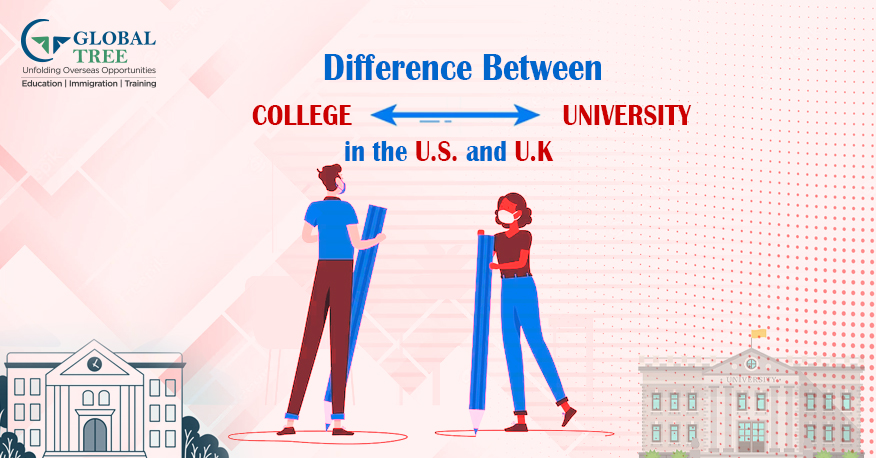The Ultimate Difference between College and University in the US and UK

- Introduction
- What are the Key Differences between a College and University?
- Types of Colleges in the United States
- Types of colleges in the United Kingdom
- Similarities in United Kingdom and the United States Education
- What is meant by "college" and "university" in the USA and UK?
- Which one should you attend: A college or a University?
- Conclusion:
Introduction
Although people frequently use the terms college and university interchangeably, these educational institutions are referred to in different ways in the United States and the United Kingdom.
When looking into possibilities for higher education in these countries, it is essential to have a solid understanding of the distinctions between these two terms.
What are the Key Differences between a College and University?
When people talk about "college" in the United States, they are often referring to an undergraduate degree programme that culminates in a bachelor's degree. It is possible for a college to exist alone or as a component of a bigger university. On the other hand, universities typically provide programmes leading to a variety of degrees at the undergraduate, graduate, and professional levels.
(Read More: Top study-abroad and work destinations for Indians)
When referring to educational establishments in the United Kingdom that provide undergraduate and graduate programmes that can lead to a variety of degrees, the term "university" is typically used. The term "college" is commonly used to refer to educational institutions that provide students with courses that are either vocational or further their education.
Types of Colleges in the United States
There are many different kinds of colleges to study in the USA that includes the following:
Community colleges are institutions of higher education that typically award associate degrees and certificates after students attend for two years. They provide students with the opportunity to complete general education requirements before transferring to a four-year college or university, and they are frequently more affordable than four-year institutions.
The liberal arts college is a type of four-year College that focuses on undergraduate education and provides a well-rounded education to its students by offering classes in the humanities, social sciences, and natural sciences, among other subjects. Schools that focus on the liberal arts tend to have lower class sizes and place a greater emphasis on the ability to think critically and write clearly.
Technical colleges are educational establishments that offer specialised training in a variety of subjects, including medicine, computer science, and engineering, among others. Students can typically receive hands-on training and internship opportunities in the USA while attending technical colleges. These opportunities are designed to prepare students for specific careers.
Vocational colleges are educational facilities that provide instruction in a variety of trades, including cosmetology, culinary arts, and automotive technology, amongst others. Hands-on instruction and, frequently, the opportunity to become certified or licenced in a particular occupation are typically offered by vocational colleges.
Types of colleges in the United Kingdom
There are several different kinds of colleges in the United Kingdom, including the following:
Sixth form colleges are educational institutions that provide programmes lasting for two years to students who have finished their secondary education (high school) and are getting ready to continue their study at a university. Sixth form colleges offer a more concentrated curriculum than typical high schools do, as well as the chance for pupils to enroll in more advanced classes to pursue education in the UK.
Colleges of further education are institutions that offer students who have completed their secondary education the opportunity to receive training and education in a particular field. Courses in sectors such as construction, engineering, and healthcare are typically found in schools that offer further education.
Specialist colleges are educational establishments that provide specialised instruction in a variety of subjects, including the arts and design, music, and the performing arts. Auditioning or submitting a portfolio is sometimes a requirement for admission to specialized universities.
Similarities in United Kingdom and the United States Education
There are some parallels between higher education in the United States and that in the United Kingdom, despite the fact that there are important variances. Institutions that focus on undergraduate education are present in both countries, in addition to institutions that provide training and education in a variety of vocations in both countries. Students in either nation can transfer from a community college to a university after completing their first two years of higher education at a two-year institution.
(Read More: What to study in the USA after 12th?)
In addition, students in either nation can pursue their academic and professional goals in a college or university because such institutions offer chances in both countries. Both provide students with opportunities to participate in extracurricular activities, internships, and other forms of experiential learning that can assist students in the acquisition of practical skills and the preparation for their future employment.
What is meant by "college" and "university" in the USA and UK?
According to the amount of education that they have attained, many Americans frequently differentiate between the phrases "college" and "university." For instance, a person will declare that they graduated from college if they have finished an undergraduate programme that lasts for four years and acquired a bachelor's degree in that time. In contrast, a person who has finished an undergraduate programme and earned a master's or doctoral degree will say that they graduated from university. Graduate degrees include master's degrees and doctoral degrees.
Because of the common usage of the word "college" to refer to secondary schools in the United Kingdom, the word "university" is used to differentiate between higher education institutions and secondary schools. There are, however, some universities that deviate from the norm, such as Oxford and Cambridge. They are the most prestigious universities in the UK but also contain colleges inside of them.
Which one should you attend: A college or a University?
Your academic and professional aspirations, your current and future financial circumstances, and your own personal preferences should all be taken into consideration when deciding whether to enroll in a college or university.
It is possible that attending a vocational or technical college can be beneficial to you if you are interested in pursuing a particular line of work, such as in the medical or culinary fields, for example. These educational establishments offer practical instruction and frequently lead to certification or licensing in a particular sector of the economy.
A liberal arts institution could be a suitable choice for you if you want to get a well-rounded education that places a strong emphasis on your ability to think critically and express yourself in writing. Students who attend these schools receive a comprehensive education that will equip them for a wide range of professional fields.
While choosing between a college and a university, it is essential to take into account the total cost of attendance, including not just tuition but also living expenditures. Community colleges and vocational colleges are typically less expensive than four-year universities, and they may also give students the opportunity to finish their education at a four-year university after completing their degree at a community college or vocational college.
(Read more: What is the Cost of Living in the USA for Indians?)
A university might be an excellent choice for you if you have your sights set on earning a graduate degree or embarking on a line of work that calls for advanced knowledge, such as a career in medicine or the legal profession. These educational establishments allow students to pursue education at the undergraduate, graduate, and professional levels.
Conclusion:
To summarise, the distinction between a college education and a university education in the United Kingdom and the United States can be murky at times. In the United States, a college is an institution that offers undergraduate study leading to a bachelor's degree, whereas a university is an educational establishment that provides study leading to a variety of degrees at the undergraduate, graduate levels.
In the United Kingdom, an educational establishment is said to be a college if it provides vocational or further education courses, whereas an educational establishment is said to be a university if it provides undergraduate and graduate programs leading to a variety of degrees.
(Read More: How to study in the UK after 12th for Indians?)
Community colleges, liberal arts colleges, technical colleges, vocational colleges, sixth form colleges, further education colleges, and specialist colleges can all be found in the United States and the United Kingdom. Other types of colleges include further education colleges, sixth form colleges, and specialist colleges.
Colleges and universities, despite their distinct differences, both offer students the chance to achieve the academic and professional goals that they have set for themselves. In the end, the decision will come down to your objectives and priorities.
In the end, whether you decide to attend a college or a university, the most important thing is to put effort into your education and make the most of the opportunities that are presented to you. This is true regardless of where you choose to pursue your education.









